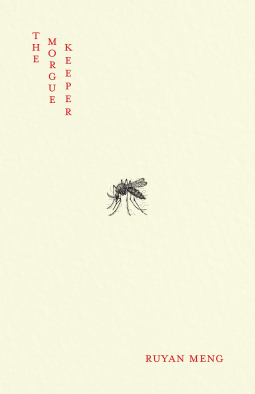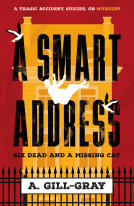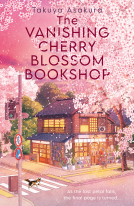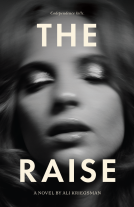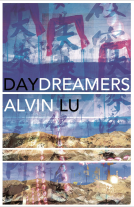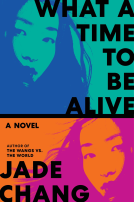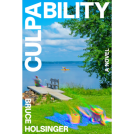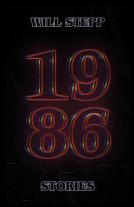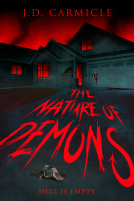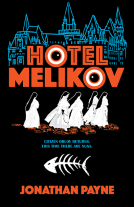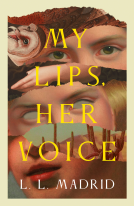The Morgue Keeper
by Ruyan Meng
You must sign in to see if this title is available for request. Sign In or Register Now
Send NetGalley books directly to your Kindle or Kindle app
1
To read on a Kindle or Kindle app, please add kindle@netgalley.com as an approved email address to receive files in your Amazon account. Click here for step-by-step instructions.
2
Also find your Kindle email address within your Amazon account, and enter it here.
Pub Date 15 Oct 2025 | Archive Date 31 Dec 2025
Leland Cheuk | 7.13 Books
Description
In 1966, as a brutal revolution grips his city, morgue keeper Qing Yuan spends his nights cleaning bodies in silence—until a viciously murdered woman, known only as “#19,” shatters his routine, and he becomes entangled in an existential quest to uncover the truth behind her fate.
Today, the rapid rise of authoritarianism around the world, with its threats of state control and political persecution, gives plenty of reason for concern here in the United States, and plenty of reason to speculate on what is soon to come. The future that Ruyan Meng ventures in The Morgue Keeper, her relentless, scintillating debut novel, is unique, one drawn from historical precedent, and from experience itself. Based on true events, it is both a tale for our uncertain time and a harrowing testimony to survival. Its hero is unforgettable: Qing Yuan’s power lies not in grand defiance, but in his unwavering faith in human kindness and compassion.
Available Editions
| EDITION | Paperback |
| ISBN | 9798989121489 |
| PRICE | US$21.99 (USD) |
| PAGES | 190 |
Available on NetGalley
Featured Reviews
 Reviewer 1553899
Reviewer 1553899
I just finished this book in one sitting omg and I honestly don’t think I’ll forget it anytime soon.
Set in 1966 during the Chinese Cultural Revolution, the story follows Qing Yuan, a morgue keeper who spends his nights cleaning bodies in silence; until the arrival of one particularly brutal case, a woman known only as “#19.” From there, the book unravels into something much deeper than a murder mystery. It becomes a journey into truth, memory, and what it means to survive in a world that wants to erase both.
This book was very chilling but not just because of the violence, but because of how quiet that violence becomes and that was what got to me. Especially the way cruelty blends into the daily routine and how people turn away from it because they’re scared or helpless or just trying to survive. It’s heartbreaking.
What really stuck with me is how relevant the book feels right now. Even though it’s set in the 1960's, I couldn’t stop thinking about how much of what’s described is happening again, RIGHT NOW. The rise of authoritarianism, the distortion of truth, the silencing of dissent; it’s not just history, it’s current reality in so many places, including here in America. That’s what made it hit so hard. It felt less like reading fiction and more like staring into a warning we keep ignoring.
The protagonist Qing Yuan isn’t some revolutionary hero. He doesn’t fight back with fire. He just refuses to let the system take his humanity. He chooses kindness. He chooses to see people as people, even when the world tells him not to. And honestly, that quiet resistance hit me harder than any dramatic rebellion ever could.
This book was so painful to read but necessary. It’s a reminder of what happens when fear rules, when truth is buried, when we look away and stay silent. And it’s also a reminder that even in the darkest systems, human decency can survive. Sometimes barely, but it survives.
I’m still sitting with this one. If you’re looking for something beautifully written, emotionally devastating, and deeply relevant to our time, this absolutely worth reading.
Thank you 713Books for my personal copy.
 Reviewer 1808863
Reviewer 1808863
Ruyan Meng’s "The Morgue Keeper" is not a novel for the faint of heart, indeed the novel at its core is an affirmation of the human spirit’s ability to persevere even after everything has been taken, after every imaginable torture and loss has been inflicted, after the world and country one knew has been completely erased. I would be remiss to open this review without a significant content warning. This book portrays the worst of humanity, the lowest depths of depravity, the most unspeakable acts we can commit against each other. Non-exhaustively, this books includes discussion or descriptions of: starvation, torture, violence, sexual assault, suicide, the abuse of animals, and many other sensitive topics. However, it is important to note that none of these descriptions or portrayals are gratuitous. The Morgue Keeper, for all the macabre imagery implied in the title alone, is not a piece of “grimdark” fiction nor does it participate in what is often termed “misery porn”. Instead this novel (which is based on true events), attempts to communicate the desolation experienced by the characters (and by extension the real people they portray) with absolute honesty, without softening the blow or turning its gaze away from their suffering.
Qing Yuan is a morgue keeper in Chairman Mao’s Revolutionary China. In June of 1966, a brutally mutilated body is delivered into his care— unrecognizable as human, still breathing her last breaths. With no name, and no cause of death listed besides “Trauma”, Qing Yuan files her into cabinet #19. From that day #19 haunts the morgue keeper, begging him to discover the cause of her death. What follows is a journey through the depths, illuminated by beautiful, restrained prose and punctuated with flourishes of magical realism and dream-like descriptions.
It is difficult to say that one might “enjoy” reading The Morgue Keeper, but as I flipped through its pages it wasn’t the violence or the horror that struck me most deeply— it was the constant assertions of hope, the never ending search for something to buoy one’s spirit above the water even as each new life-preserver was snatched away or sucked under. I kept reading because I had to know if such hope was possible, if it could be sustained into some kind of conclusion, and I did not come away empty handed.
Thank you Leland Cheuk and NetGalley for the ARC!
 Isabella D, Reviewer
Isabella D, Reviewer
If you read just one book in 2025, make it this one!
In The Morgue Keeper, author Ruyan Meng crafts a brilliant, timeless, and perspective-shifting cultural commentary. In precisely 200 pages, Meng holds a torch to the most severe flaws of mankind and then sets them aflame with hope. Thus, The Morgue Keeper is essential reading for anyone who feels hopeless, numb, or desensitized in the face of current affairs. The book’s length and language make this story accessible to even the most casual of readers.
The Morgue Keeper follows Qing Yuan, a man who has little to his name but compassion to spare, during China’s Cultural Revolution. In many ways, he exists on the fringes of society, sleeping through his neighbors’ waking hours in order to work the night shift cleaning corpses at the local hospital. Despite the dismal circumstances of his life and the grotesque realities he is exposed to daily, Qing Yuan has not been hardened by his physical and emotional toils. His story reminds us that these are precedented times we are living in.
I don’t often read historical fiction in its purest form, but I am so glad I picked this book up. As soon as I finished reading it, I wanted to turn back to page one and begin again. This book has every element of a modern classic. I sincerely hope it gets the recognition it deserves come publishing day.
Thank you to NetGalley and 7.13 Books for the arc in exchange for an honest review :)
 Moira F, Reviewer
Moira F, Reviewer
The Morgue Keeper is a haunting, elegant, and deeply atmospheric debut that completely consumed me. Ruyan Meng crafts a story that pulses with quiet dread, where the dead don’t just linger—they speak, and not always in words. This is horror at its most poetic and philosophical, rooted in grief, memory, and the eerie weight of unspoken truths.
From the opening pages, I was drawn to the stillness of the morgue, the loneliness of the keeper, and the creeping sense that something wasn’t quite right. But rather than jump scares or gore, Meng builds her horror slowly—like fog curling around your ankles—until you’re fully immersed in a world where life and death blur, and the past refuses to stay buried.
The prose is spare and lyrical, each sentence deliberate, each image etched with precision. There’s a melancholy beauty to it all, and the emotional resonance hit me harder than I expected. It’s not just about the bodies—it’s about the stories they leave behind, and the weight the living must carry.
If you’re drawn to quiet, character-driven horror with a literary sensibility and emotional depth, The Morgue Keeper is a stunning, unforgettable read. It left me chilled, but also strangely comforted—like I’d been allowed to witness something sacred and strange.
This story, based on real events during the Mao Zedong era in China, was shocking in its detail, but beautiful in the way it portrayed human resilience in the harshest of environments. I didn't know much about this part of history so I went in blind. While it was an emotionally challenging read, I really appreciated the way the author was able to take events that are so remote from my reality and make them relatable and relevant in our shared human experience. It was a short read, and I highly recommend it.
 Reviewer 1825809
Reviewer 1825809
Thanks to NetGalley for providing eARC.
I just finished Han King’s masterpiece Human Acts, so my headspace was acclimated to the grisly content, but this book still hit me very hard; I felt like I was there next to Qing Yuan trying to preserve my humanity and sanity while slowly losing (almost) everything.
Some images that will stay with me: morgues as gateways to cosmos, mosquitoes in the coal room, the beautiful and evil Red Guard lieutenant, the wonderful Lio Jia singing “The Internationale” while dressing corpses in circus costumes and “entertaining the cosmos with his slapdash song”, ghosts in hallucinations….
This book is especially timely being published in 2025 as the US becomes ever more authoritarian with each day. History shows us how this experiment works out: people turning on each other, the “struggle sessions” and “dazibao” (big character signs, see China in Ten Words for an excellent summary), which reminiscent of the vitriol spewed on social media, cable news, and from Trump’s mouth.
As a cat mom, I was holding my breath rooting for little Xi’er.
Favorite quote:
“He thought at times he could hear the earthworms crying”
 Reviewer 1262898
Reviewer 1262898
THE MORGUE KEEPER REVIEW
RATING: 5
GENRE: Literary fiction, Historical fiction
The Morgue Keeper is a hauntingly beautiful book written by Ruyan Meng. Though the synopsis hints at a mystery that our protagonist tries to solve, this book is much more than that. It takes place in China during the Cultural Revolution where communism has begun to take over. The shift in how the country is run is apparent as we follow Qing Yuan through his daily live as a morgue keeper and someone who is considered a member of the proletariat.
I believe everyone should read this book - this is eye-opening on the commentary of the treatment of human kind. What makes us human and how do humans quickly turn on each other? The book delves into the mindset of a broken man who continues to live through many atrocities while attempting to maintain a shred of human empathy.
Though it is a relatively short read, the topic is heavy and at times, there are events that occur that can be considered grotesque. However, I highly urge everyone to take a chance and read this book. It was eye-opening and made me curious to spend some time researching into more details about those who were considered counterrevolutionary during this period.
Thank you 7.13 Books, Leland Chuck, and Netgalley for the opportunity to read this book. For those who enjoyed the focus on the human experience during historical periods, such as Han Kang’s Human Acts, please pick up this book on 10/15/25.
 Molly B, Reviewer
Molly B, Reviewer
The Morgue Keeper hit me harder than I expected. It’s not a loud or flashy book it’s quiet, grim, and precise but it gets under your skin in this slow, deliberate way. At first, I wasn’t sure what I was getting into. The opening is emotionally cold, kind of clinical, with Qing Yuan just doing his job, methodically logging the dead. But that coldness makes sense. It mirrors the numbness he has to live with just to survive. Once the story shifts and he’s arrested and thrown into that coal room, everything tightens. I found myself holding my breath during those parts. The fear and paranoia are suffocating, but not in a melodramatic way. It just feels real, like you’re in there with him and there’s no way out.
What I loved most was how restrained the writing is. It doesn’t rely on shock value or overly emotional language to make its point. It just tells the truth of what it was like to live through that time. Qing Yuan isn’t a big hero or a rebel he’s just a man trying to stay human in a world trying to erase humanity. That made him incredibly compelling to me. The strength of this book is in the way it shows quiet resistance just existing, remembering, telling the truth when you can. That hit deep. It’s not always an easy book to sit with, and honestly, it left me drained in the best way. I felt like I’d been trusted with something important by the time I finished.
 Ashley P, Reviewer
Ashley P, Reviewer
I’m not sure what I was expecting when I started this book based on other reviews, but it was a fantastic read. The story was raw, emotional, violent, and deeply disturbing given the current state of affairs IRL. The main character finds small bits of hope and happiness while being publicly condemned and brutalized for his father’s past decisions. I found it to be less about the mysterious woman in the morgue that’s introduced in the beginning and more about the unbreakable human spirit in the face of unimaginable circumstances.
 Reviewer 1045807
Reviewer 1045807
I was initially attracted by the title because it sounded like it was going to be a dark read and it was. It starts off at quite a slow pace as we follow the morgue keeper as he goes about his quiet daily routine under the rising of the Red Army.
I found it slow to start but I feel this was important to let the reader know what life was like, as the keeper gets dragged into the brutalist regime the pace picks up and I found it quite harrowing. He is quiet in person and in life as though to not draw any attention to himself. In the story, he receives a mutilated female body only known as #19, and is determined to find out what happened to her. The brutality of the regime was beyond comprehension and I think this book will be well received.
 Maria J, Reviewer
Maria J, Reviewer
It will take me some time to recover from this book. How lucky am I to be able to.
The Morgue Keeper broke my heart more times than I can count. Set during China’s Cultural Revolution, it follows morgue keeper Qing Yuan — a quiet man trying only to survive, to share what little he has, and to hold on to decency while the world crumbles around him. The violence is brutal, the cruelty unbearable, but what stayed with me most was the humanity: cigarettes shared in silence, food offered to those everyone else called trash, a man who still believed people were worth saving.
This isn’t an easy read, but it is a necessary one. Reminded me of Human Acts in tone and emotional weight. I'm grateful to have read it.
Thank you to NetGalley and the 7.13 Books for making it possible.
Historical fiction isn’t one of my preferred genres, but I went into THE MORGUE KEEPER with an open mind. This debut novel is set in 1966 during the Chinese Cultural Revolution under the leadership of Mao Zedong, and follows conscripted morgue keeper Qing Yuan, whose life as a solitary, introspective man changes as he comes across a murdered young woman in the morgue.
When no one comes to claim her, Qing Yuan sets out to find out what happened to her. But that isn’t the only plot in this book. The other plot describes the brutality experienced by the residents under Mao’s regime, including public “struggle sessions” and frequent beatings by the Red Guard which were common during this time.
With just under two hundred pages, this novel really packs a punch. Beijing was such a dirty, inhospitable, and bleak place during these times, but Qing Yuan’s enduring human spirit, generosity, and compassion for others prevails. I appreciated that he could provide solace to others when he was suffering himself. This book will stay with me for a long time.
🌟Thanks to the author, publisher, and NetGalley for a copy of this book in exchange for an honest review.🌟
Dang. That ending.
Fantastic. Worthy of 5 star. Deep. Dark. Reality. Correlation from the communist uprising in China to the modern fascist uprising in America. The steps are there, and it's eerie.
At the 41% mark: "One evil man, he thought , a single evil man, had reduced him and his millions of fellows to creatures who existed to be crushed."
Eerie. The similarities is off putting and gave me a sinking feeling. The darkness that surrounds our main character is horrendous and happens time after time in human history. Humans are destructive.
And when there's a glimmering line of hope - it gets imprisoned, massacred, shoved into a hell hole.
All we have in the middle of death and insanity is hope. All we can do is hold on. This is a must-read.
Thank you at Netgalley.com for the ARC. I am amazed at this shorter book. It packs a punch.
This is a book that eats away at you even after you finish it. The blurb almost makes the book seem like a murder mystery. But while the search for the identity and cause of #19’s murder is an early driving point of the plot, it takes a backseat for the majority of the novel. Instead, The Morgue Keeper is a raw depiction of humanity, how it is lost through political control and herd mentality, and how Qing Yuan is able to maintain his despite social, mental, and physical cruelty and torture. Beyond the main focus on Qing Yuan, the complex side characters beg the reader to question how we treat each other and what the morally correct course of action is in tough situations.
The Morgue Keeper is a masterclass in showing without telling which makes it rich for interpretation. I received an eARC for my honest review, and upon publication I will purchase a print copy to annotate and revisit.
"Few if any had considered how far they’d had to stoop to embrace a joy born of savagery." (138)
"Sometimes, he reflected, it’s better to remain in the dark, not for the sake of the dark, but because it was kinder than the light." (167)
 Reviewer 1821119
Reviewer 1821119
I feel so privileged to have had the opportunity to read this ARC of the Ruyan Meng's The Morgue Keeper, provided by NetGalley
This was a painfully beautiful Literary Historical novel. In just under 200 pages Ruyan has waived a multilayer story that is both, in turn a disturbing and uplifting commentary on human kind.
Set during the Cultural Revelation in China we follows Qing Yaun as he tries to solve the mystery of the death of a women No.19 brought to the morgue where he works. Along side the mystery we are given a window into the raise of communism and how the regime change, lead to a period of human atrocity, with the de-humanizing and horrific treatment of one group of people by another.
Despite its heavy topic and at times grotesque depictions of human kind at its worst, this was ultimately a moving and uplifting story, as even though Qing is a broken man, and experiences horrific and humiliating treatment at the hands of his neighbours and government, Qing is able to maintain his humanity and continue to show empathy and care to those around him including a kitten who comes to be his closest companion.
This is not a period of history I don't know well but this novel has inspired me to read more around this in the future.
I would highly recommend this book and will be buying my own copy, and would be interested in picking up any further works by this author.
I truly hope that this book receives the success is so deserves.
This book will stick with me for quite some time, in the best way possible. It’s a hard read, in the sense the hardships the characters faced throughout the book was brutal. It was raw, thought provoking, and deep. Incredibly well written, it places you in the scene and you can easily immerse yourself into the time and place with the main character. I absolutely could not put it down. Before reading, I was unfamiliar with the historical events outlined in the book, and it made me research further once I finished reading. A huge thank you to the author, Ruyan Meng, the publisher, and NetGalley for allowing me the opportunity to read this book.
